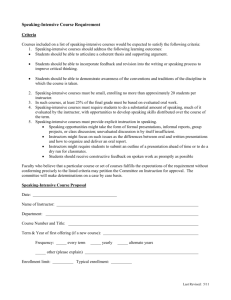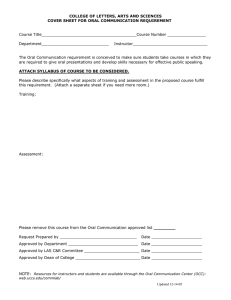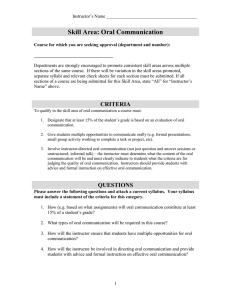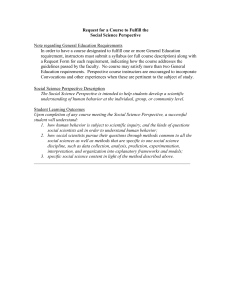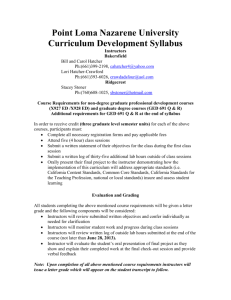Syllabus Reading 101 How to Read a Syllabus LLCC Learning Lab
advertisement
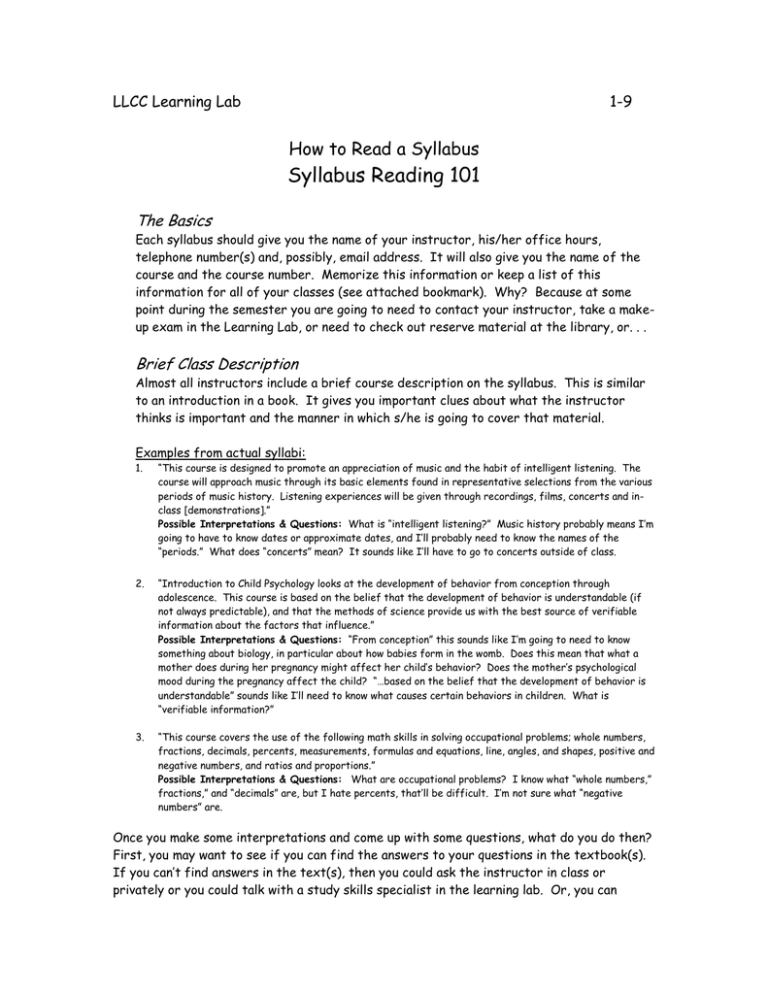
LLCC Learning Lab 1-9 How to Read a Syllabus Syllabus Reading 101 The Basics Each syllabus should give you the name of your instructor, his/her office hours, telephone number(s) and, possibly, email address. It will also give you the name of the course and the course number. Memorize this information or keep a list of this information for all of your classes (see attached bookmark). Why? Because at some point during the semester you are going to need to contact your instructor, take a makeup exam in the Learning Lab, or need to check out reserve material at the library, or. . . Brief Class Description Almost all instructors include a brief course description on the syllabus. This is similar to an introduction in a book. It gives you important clues about what the instructor thinks is important and the manner in which s/he is going to cover that material. Examples from actual syllabi: 1. “This course is designed to promote an appreciation of music and the habit of intelligent listening. The course will approach music through its basic elements found in representative selections from the various periods of music history. Listening experiences will be given through recordings, films, concerts and inclass [demonstrations].” Possible Interpretations & Questions: What is “intelligent listening?” Music history probably means I’m going to have to know dates or approximate dates, and I’ll probably need to know the names of the “periods.” What does “concerts” mean? It sounds like I’ll have to go to concerts outside of class. 2. “Introduction to Child Psychology looks at the development of behavior from conception through adolescence. This course is based on the belief that the development of behavior is understandable (if not always predictable), and that the methods of science provide us with the best source of verifiable information about the factors that influence.” Possible Interpretations & Questions: “From conception” this sounds like I’m going to need to know something about biology, in particular about how babies form in the womb. Does this mean that what a mother does during her pregnancy might affect her child’s behavior? Does the mother’s psychological mood during the pregnancy affect the child? “…based on the belief that the development of behavior is understandable” sounds like I’ll need to know what causes certain behaviors in children. What is “verifiable information?” 3. “This course covers the use of the following math skills in solving occupational problems; whole numbers, fractions, decimals, percents, measurements, formulas and equations, line, angles, and shapes, positive and negative numbers, and ratios and proportions.” Possible Interpretations & Questions: What are occupational problems? I know what “whole numbers,” fractions,” and “decimals” are, but I hate percents, that’ll be difficult. I’m not sure what “negative numbers” are. Once you make some interpretations and come up with some questions, what do you do then? First, you may want to see if you can find the answers to your questions in the textbook(s). If you can’t find answers in the text(s), then you could ask the instructor in class or privately or you could talk with a study skills specialist in the learning lab. Or, you can simply wait until the information is presented in class. The point here is that by looking at the brief class description you get mentally prepared for what is to come. It’s not important that you know all these things before you take the class. Text & Supplies In this section of the syllabus the instructor will list what book(s) or other reading materials will be used in the class. In some classes (most notably art classes) you will need to buy materials that you will use in and out of class. The instructor will list the supplies you need in the syllabus or will hand out a list in class. Some English classes require a student to use a 3-ring binder. Calendar Some instructors will include a calendar with the syllabus. Some instructors give specific dates when reading assignments, homework, exams, and such are due. Other instructors provide a more vague “calendar” that lists reading assignments, homework, exams, and such by weeks, e.g. Week One: Read Introduction and Chapter One. . .Week Four: First exam. Grades Most instructors will explain how you will be evaluated (graded) in his/her class. Some will list specific assignments, exams, and such and give the specific amount of points each is worth. Others will give percentages such as homework will count 20% of your grade, exams will count 40%, etc. Attendance High school students have little choice about attending classes. College is different. No one is requiring you to be here. However, community college instructors want students to attend their classes. It is extremely rare to find an exception to this. It’s simply common sense that students who attend classes earn higher grades. Some instructors will state in their syllabus that you are expected to attend class but that you will not be directly penalized for not attending. Other instructors will either reinforce your attendance by giving you credit for attending or they will penalize you for not attending. Lincoln Land Community College policy states that a student can be dropped from a class for nonattendance at the discretion of the instructor. It is important for you to understand the various attendance policies stated in your classes. Don’t assume they are all the same. Note: Some students quit attending classes assuming their instructor will automatically drop them. Don’t make this assumption. If you think you have been dropped check with the instructor or registration to make sure. Likewise, if you are going to drop a class you must follow a specific process. Many students are shocked when they get their grades at the end of the semester to find out they were not dropped from a class thus receiving an “F.” Class Behavior Unfortunately, there are increasing incidents of inappropriate behavior in college classrooms. Many college instructors are adding statements about behavior expectations of students in their classes. Please note that a student can be required to leave class until s/he seeks help with the inappropriate behavior. Or, a student can be dropped from a class because his/her behavior is inappropriate. This decision is the instructor’s. lvb/Su/04
